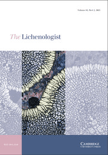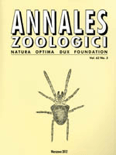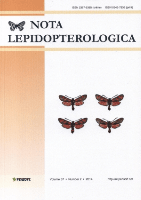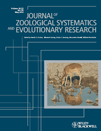
Asian Myrmecology
Scope & Guideline
Pioneering Studies on Ant Behavior and Ecosystem Dynamics
Introduction
Aims and Scopes
- Taxonomy and Systematics:
The journal frequently publishes detailed taxonomic studies, including descriptions of new species and revisions of existing genera, contributing significantly to the understanding of ant biodiversity in Asia. - Ecology and Behavior:
Research on ant behavior, including foraging strategies, nesting habits, and interactions with other species, is a core focus, highlighting the ecological significance of ants in various environments. - Biogeography and Distribution:
Papers often explore the geographical distribution of ant species, examining how historical and ecological factors shape ant communities across different regions in Asia. - Evolutionary Biology:
The journal includes studies on evolutionary adaptations, such as reproductive strategies and physiological adaptations, which provide insights into the evolutionary processes shaping ant diversity. - Conservation and Environmental Impact:
Research that addresses the conservation status of ant species and their roles in ecosystems is increasingly prominent, reflecting a growing awareness of environmental issues.
Trending and Emerging
- Molecular and Genetic Studies:
There is a growing trend towards incorporating molecular techniques to study ant genetics, phylogenetics, and evolutionary relationships, enhancing our understanding of ant diversity and evolution. - Behavioral Ecology:
Recent publications increasingly delve into specific behavioral aspects of ants, such as recruitment strategies and trophic interactions, indicating a heightened interest in how ants interact with their environment. - Conservation Biology:
Research addressing the conservation of ant species and their habitats is on the rise, reflecting heightened awareness of biodiversity loss and the ecological importance of ants in ecosystems. - Invasive Species Research:
Studies focusing on the impacts of invasive ant species and their management are emerging as significant themes, highlighting the ecological consequences of global trade and climate change. - Interactions with Other Organisms:
There is an increasing emphasis on the mutualistic and antagonistic relationships ants have with other species, including plants and herbivores, showcasing their ecological roles beyond mere population studies.
Declining or Waning
- General Ant Ecology:
Although ecological studies are still present, there has been a noticeable decline in broad ecological assessments of ant communities, with a shift towards more specific behavioral and taxonomic studies. - Morphological Studies:
Research focused solely on morphological characteristics of ants appears to be decreasing, potentially due to the rise of molecular techniques that provide more comprehensive insights into ant taxonomy and phylogeny. - Historical and Anecdotal Accounts:
The publication of historical accounts and anecdotes related to ant research has become less frequent, as the journal increasingly prioritizes empirical research and data-driven studies.
Similar Journals

ZOOLOGICHESKY ZHURNAL
Fostering a deeper understanding of life’s diversity and evolution.Zoologichesky Zhurnal, a prominent journal in the field of Ecology, Evolution, Behavior and Systematics, has been a vital publication since its inception in 1950. Published by MAIK Nauka-Interperiodica in the Russian Federation, this journal has established a notable reputation in disseminating scientific research and advancing knowledge in zoology. With its coverage spanning from 1950 to 2023, and a specific convergent focus during 1982-1983, this journal contributes significantly to the ecological and evolutionary sciences, even though it currently holds a Q4 classification in the 2023 category quartiles, indicating its niche positioning among peers. Researchers and students engaged in the study of biological sciences, particularly those interested in the dynamics of ecosystems, behavior of species, and evolutionary processes, will find valuable insights and original research articles within its pages. While access to this esteemed journal is not open, it remains an essential resource for those seeking to deepen their understanding of zoological sciences.

ICHTHYOLOGICAL RESEARCH
Exploring the depths of fish biology and conservation.Ichthyological Research is a prominent journal in the field of ichthyology, focusing on the biology, ecology, and conservation of fish species and their habitats. Published by Springer Japan KK, this journal has been a significant contributor to aquatic research since its inception in 1996 and will continue to disseminate cutting-edge findings through 2024. With an Impact Factor that places it within Q2 of the Ecology, Evolution, Behavior, and Systematics category, it ranks #318 out of 721 in Scopus, situating it in the 55th percentile of its field. This journal serves as a valuable resource for researchers, professionals, and students, offering open access to vital studies that drive forward our understanding of fish ecology and biodiversity. Located in Tokyo, Japan, Ichthyological Research aims to bridge gaps between theoretical research and practical application, emphasizing the conservation of aquatic ecosystems.

LICHENOLOGIST
Illuminating the Hidden Life of LichensLICHENOLOGIST is a prestigious journal published by Cambridge University Press, dedicated to advancing the field of lichenology and promoting a deeper understanding of the ecology, evolution, and systematics of lichens. Established in 1958 and focusing on the convergence of research through 2024, this journal has established itself as a significant resource within the Q2 category of Ecology, Evolution, Behavior and Systematics. With a Scopus ranking of #316 out of 721 in its field, it highlights research that not only enhances academic knowledge but also has practical implications for ecology and conservation efforts globally. Although traditionally not an open-access journal, it provides valuable insights and contributes to the scientific community by disseminating high-quality, peer-reviewed research. LICHENOLOGIST is essential for researchers, professionals, and students looking to stay informed about the latest advancements in lichen studies, making it an indispensable resource for anyone involved in ecological and biological sciences.

ANNALES ZOOLOGICI
Unveiling the Mysteries of Ecology and EvolutionANNALES ZOOLOGICI is a distinguished academic journal published by the Museum & Institute of Zoology, Polish Academy of Sciences, based in Warsaw, Poland. With a long-standing tradition in zoological research, this journal has evolved to encompass a diverse range of studies in ecology, evolution, behavior, and systematics, aiming to foster a deeper understanding of animal biology and conservation. It holds a commendable Q2 classification in the 2023 Ecology, Evolution, Behavior and Systematics category, indicating its significant contribution to the field. Although ANNALES ZOOLOGICI is not an open-access publication, it remains accessible to a global audience of researchers, professionals, and students aiming to advance their knowledge and engage with cutting-edge zoological findings. As of 2024, this journal continues to be a vital resource for those eager to explore the complexities of animal life and contribute to ongoing discussions within this essential scientific discipline.

ZHURNAL OBSHCHEI BIOLOGII
Advancing Research in Ecology and EvolutionZHURNAL OBSHCHEI BIOLOGII, published by MEZHDUNARODNAYA KNIGA in the Russian Federation, is a venerable journal with a rich history originating in 1945. Renowned for its contributions to the fields of Ecology, Evolution, Behavior, and Systematics, as well as Medicine (miscellaneous), this journal provides a platform for researchers and professionals to disseminate significant findings within these domains. Although currently not classified as an open access publication, ZHURNAL OBSHCHEI BIOLOGII holds a Q4 quartile designation in its respective categories, reflecting its unique positioning within the global research landscape. While its coverage in Scopus is limited, the journal remains an important resource for academics interested in the evolution of biological sciences, especially within the context of Russian research traditions. By fostering scholarly communication and collaboration, ZHURNAL OBSHCHEI BIOLOGII continues to play a critical role in advancing knowledge in the biological sciences.

Myrmecological News
Highlighting the Ecological Importance of Ants WorldwideMyrmecological News is a premier open-access journal dedicated to the vibrant field of insect science, with a specific focus on the study of ants and their ecological significance. Published by the renowned Oesterreichische Gesellschaft Entomofaunistik in Vienna, Austria, this journal has been a crucial platform for researchers, professionals, and students alike since its inception in 2009. With a remarkable Q1 ranking in Insect Science and a commendable Scopus rank of 13 out of 181 (93rd percentile), it showcases high-quality research that advances our understanding of myrmecology. The journal not only emphasizes innovative methodologies and findings but also aims to foster interdisciplinary dialogue among scholars in related domains. Researchers can access a wealth of knowledge on ant behavior, ecology, and conservation strategies that are pivotal for biodiversity preservation. Please consider contributing to this vital body of work as we explore the multifaceted roles these fascinating insects play in our ecosystems.

NAUTILUS
Diving Deep into Ecology and EvolutionNAUTILUS is a distinguished journal published by the Bailey-Matthews Shell Museum, dedicated to advancing the understanding of aquatic sciences as well as ecology, evolution, behavior, and systematics. With an ISSN of 0028-1344, NAUTILUS has played a significant role in the scholarly community from its inception, with publication converged between 1996 to 2015 and 2017 to 2024. Although currently categorized as Q4 in Aquatic Science and Ecology, Evolution, Behavior and Systematics for 2023, the journal has a reputation for publishing high-quality research that contributes to the broader scientific discourse. Researchers and students alike can benefit from the insights provided by NAUTILUS, which remains committed to exploring the intricate relationships within aquatic ecosystems. Its editorial management, led by Dr. José H. Leal, ensures rigorous peer review and academic excellence, making it a crucial resource for those dedicated to discovering the complexities of aquatic and ecological research.

NOTA LEPIDOPTEROLOGICA
Illuminating the ecological significance of Lepidoptera.NOTA LEPIDOPTEROLOGICA, an esteemed journal published by Pensoft Publishers, has been a cornerstone in the fields of Insect Science, Animal Science, Ecology, and Evolution since its inception in 1995, with a commitment to open access publication since 2014. Based in Sofia, Bulgaria, this journal serves as a vital platform for researchers and professionals alike, facilitating the dissemination of significant findings related to Lepidoptera and broader ecological interactions. With an impressive scope covering vital aspects of biodiversity and taxonomy, NOTA LEPIDOPTEROLOGICA holds a Q3 ranking in its categories according to the 2023 metrics and plays a crucial role in advancing our understanding of insect science. By fostering international collaboration among scholars, the journal not only emphasizes the ecological importance of Lepidoptera but also contributes to global conservation efforts, making it an indispensable resource for students and experienced researchers aiming to deepen their knowledge in these fields.

ACTA ZOOLOGICA BULGARICA
Unveiling Nature's Secrets, One Study at a TimeACTA ZOOLOGICA BULGARICA is a prominent academic journal dedicated to advancing knowledge in the fields of Animal Science, Zoology, Aquatic Science, Ecology, Evolution, Behavior, and Systematics. Published by the Institute of Zoology, Bulgarian Academy of Sciences, this journal serves as an invaluable platform for researchers, professionals, and students to disseminate their findings and engage with contemporary issues in biodiversity and ecology. With an established history since its convergence in 2010 and an ongoing publication schedule through to 2024, the journal holds a Q4 category ranking in multiple disciplines, highlighting its role in fostering scholarly communication in these areas despite its recent entry into Scopus-indexed rankings. Although currently not an open-access journal, ACTA ZOOLOGICA BULGARICA remains a key resource for those interested in the latest research and developments, particularly within the ecological and zoological landscapes of Europe and beyond.

JOURNAL OF ZOOLOGICAL SYSTEMATICS AND EVOLUTIONARY RESEARCH
Advancing the Frontiers of Zoological KnowledgeThe Journal of Zoological Systematics and Evolutionary Research, published by Wiley-Hindawi, stands as a premier academic journal since its establishment, showcasing cutting-edge research in the fields of Animal Science, Zoology, and Ecology. With an impressive track record spanning from 1963 to the present, this journal has earned a Q1 classification in both Animal Science and Ecology, as well as recognized rankings in Genetics and Molecular Biology. Its impact is highlighted by its Scopus ranks, placing it in the top percentile for relevant categories, underscoring its vital role in advancing knowledge and understanding within these disciplines. Researchers, professionals, and students will find a wealth of high-quality, peer-reviewed articles that contribute to the evolutionary understanding of biodiversity and systematics. Though not an Open Access journal, it remains accessible to a wide audience committed to exploring the intricacies of zoology and evolutionary biology.